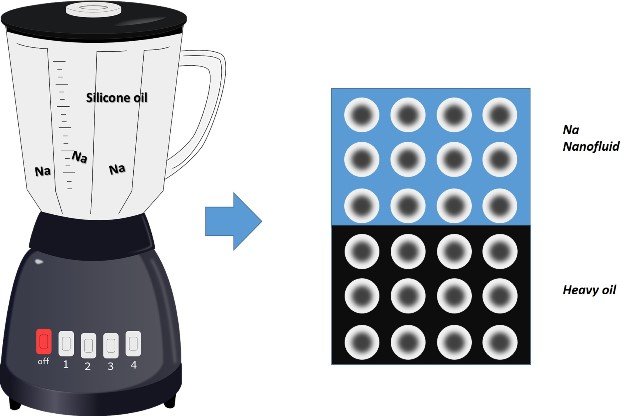Sodium nanoparticle synthesis could make a difference in oil recovery

A nanofluid shows great promise for in-situ recovery of highly viscous crude oil. Source: Wikimedia commons.
The technologies currently available for oil recovery are not adapted to increasingly heavy oil, and therefore suffer from low efficiency, high operational costs and environmental concerns, because as the structure of oil becomes more complex, the oil becomes heavier and more viscous, causing flow problems under regular conditions. New forms of crude oil recovery are being used, and nanotechnology is being studied with much interest to solve these difficult problems in the oil industry, in a sustainable way and satisfying economic demands.
In this regard, a group of researchers from the University of Houston have recently demonstrated that an inexpensive, non-toxic nanofluid can be used to effectively recover high viscosity heavy oil from reservoirs. This nanofluid was made in a common domestic blender and uses commercially available sodium, and in laboratory tests it was possible to recover 80% of an extra-heavy oil with a viscosity of more than 400,000 centipoise at room temperature. The report, published in Materials Today Physics, suggests a cost-effective and environmentally sustainable use of nanotechnology in oil production.

Schematic illustration of sodium nanoparticle synthesis. Source: Image designed by @emiliomoron in powerpoint, contains public domain image: blender.
The study revealed that nanofluid works in the recovery of oil from the reservoir through three stages: First, a chemical reaction occurs when the sodium nanoparticles come in contact with the reservoir water generating heat, which would be equivalent to techniques where the reservoir is flooded with steam to push the oil, but without the need for an external heat source and the consequent production of greenhouse gases. On the other hand, the nanofluid induces a reaction that produces sodium hydroxide, a substance used to promote the movement of oil through reactions that decrease its viscosity. And in a third stage, hydrogen gas is produced, which can be used for gas flooding, something also used for oil recovery.
Sodium is an element that is highly reactive in contact with water, producing a rapid and exothermic reaction, which although it could be used to generate heat and steam in the deposit, it is also difficult to control, since putting it in early contact with water would lead to a premature or localized reaction that would not bring any benefit. To solve this problem, the researchers prepared sodium nanoparticles in silicon oil, which allowed the sodium to disperse through the deposit before contacting the water present in it.
In the study, the researchers recognize that no two oil fields are exactly the same, so the concentration of the nanofluid must be adjusted to the real conditions in which it would be used, but being the first research of this type they predict many application and development opportunities; since the nanofluid should be able to be used to address the problems of recovery of conventional light oil due to its benefits of gas generation, IFT reduction, emulsification of crude oil, etc. It should also have the potential to extract oil from oil sands
In conclusion, this group of researchers found a fast and economic method to synthesize sodium nanoparticles, being this colloidal sodium fluid chemically stable, a promising way for in-situ recovery of highly viscous crude oil, even at room temperature.
Thanks for coming by to read friends, I hope you liked the information. See you next time.

This post has been manually curated by @bala41288 from Indiaunited community. Join us on our Discord Server.
Do you know that you can earn a passive income by delegating to @indiaunited. We share 80 % of the curation rewards with the delegators.
Here are some handy links for delegations: 100HP, 250HP, 500HP, 1000HP.
Read our latest announcement post to get more information.
Please contribute to the community by upvoting this comment and posts made by @indiaunited.
Thanks!